Applying to US Med School as an International Student
08.14.2020 • 10 min read
Why doctor?
I’ve always wanted to be a doctor as I grew up. Of course, I’ve heard the stereotype that Asians want to be doctors because their family wants them to or because it makes you a lot of money.
My family did not demand me to be anything; I just want to help people when they are most vulnerable and need help the most. Everyone has a story. I feel like dedicating my time to make someone be the person they meant to be and keep writing their stories is the most beautiful and admirable thing, whether that person is a husband, a mother, a teacher, or a pilot. The profession is constantly challenging and pushes me to be a lifelong learner. It also offers a holistic approach to caring for individuals and provides the emotional reward of making someone feel better.
If you are interested in studying medicine in America, you must have an answer to this question. Why do you want to study medicine? This is not just an interview question. You also need to use this question to remind yourself why you chose this path. That’s how you can have enough motivation to keep fighting.
All right, in the article, I will talk about my background, things you need to apply for medical school, what have I done so far, things you need to know as an international student, and some of my thoughts. And just a disclaimer, this article will mainly focus on U.S. mainland M.D. programs. I have not done enough research for D.O. program or Caribbean schools. And when I say international students, I mean students with a student visa like F-1or J-1, not counting students with a green card or duo citizenship.
What’s the process like?
When I was 15, I came to Kentucky to attend high school. Now, I’m a third-year biomedical engineering student at the University of Florida. Part of the reason I came to the U.S. so early was to get used to American culture and get familiarized with the language in order to help me get into a good college, therefore a good medical school. Before I came to America, I had some ideas about how complicated it is to apply for medical school, but little did I know I had just scratch the surface.
In China, students can apply for medical school after high school. They graduate, then apply for residency. However, if you want to do a little more and advance your degree, you can get a master’s or doctoral degree. However, in America, when you finish high school, you generally need to get an undergraduate degree first, then go to medical school. And say that the process is complicated is an understatement. Let me try to unravel it a little bit.
First of all, the academic requirements.
Most medical schools will require certain prerequisite courses during your undergraduate years. Each medical school may have slightly different requirements, but the majority of them are the same. Classes such as mathematics, biology, chemistry, physics, humanities are generally required, but classes like microbiology or genetics can vary depending on the school. Some schools may recommend you to have them; other schools may not care if you have them or not. So make sure you double-check with the schools you are interested in. This information can be found on their official websites, normally under Admission, then Prerequisite Requirement.
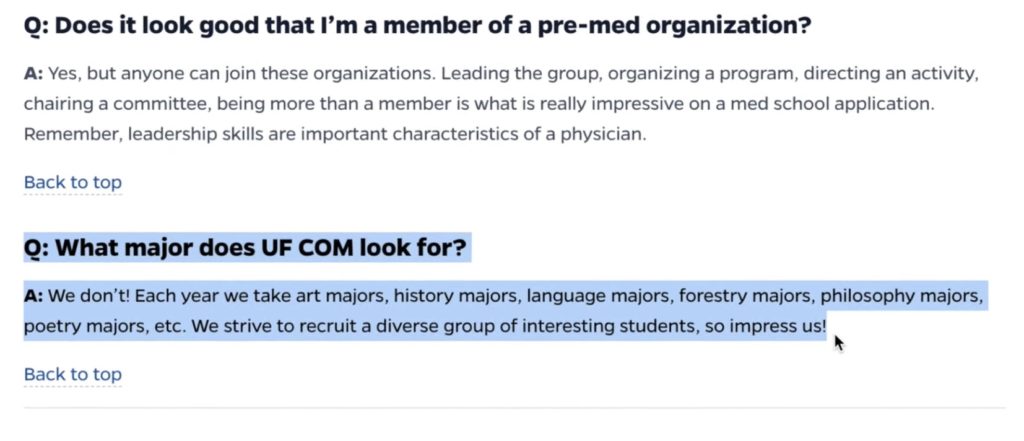
A lot of students may be a little confused when it comes to picking a major. Are there any majors that medical schools prefer more than others? As far as I know, majors don’t matter. Medical schools tend to like diversity. They want a little bit of everything. Choosing majors like history, politics, finance is treated the same as majors like biology and chemistry. There is no difference. As long as you are taking all the required prerequisite courses, your major does not have a significant impact on your admission. What matters is picking a major you like. That’s how you can improve your GPA, which is very important when applying for med school. Some students may wonder, what are the GPA requirements. Med school tend not to tell you specific numbers. But sometimes they do announce the average or percentiles GPA from previous years. Definitely check it out if you are interested.
There’s a very important exam called the MCAT. It’s an abbreviation for Medical College Admission Test. This is an essential exam for applying to medical school. Students usually prepare during their junior or senior year. It’s generally available from January to September, and there are at least 3 to 4 exams each month. After you finish the exam, it takes about a month to get your results. But please don’t go to the exam without preparing for it. It’s not the same as the SAT. I remember taking the SAT three times and ACT three times as well. But for MCAT, the fewer times you take it, the better. Generally, taking it once or twice is optimal. If you take it too many times, it’s going to work against you when you apply.
In addition to the courses and grades, extracurricular activities are also important.
First, let’s talk about volunteering. Schools generally look at two types of volunteering. One is clinical volunteering, the other is non-clinical volunteering. Clinical volunteering includes running around in a hospital or helping out in your local clinics. In short, they are volunteering activities in a medical setting. Non-clinical volunteering is doing things in your community, for example, volunteer at the food pantry, Salvation Army, or animal shelter. These activities will count toward non-clinical volunteering. They are both very important. You should for sure do them both if you have time.
Aside from volunteering, another very important activity is shadowing. Medical schools can see a lot from this activity. They can find out if you have a basic understanding of the medical setting and if you are truly interested in medicine. Your mission is to follow around an attending physician. Go wherever they go, like a shadow, hence shadowing. You get great opportunities to ask the doctor questions such as how did they get into medical school, their views about medicine, or what do they think about medicine as a career. At the same time, the medical school can also find out your interpersonal skills. Usually, only students with strong motivations can get a shadowing position. These students possess the drive to ask more people when they are turned down.
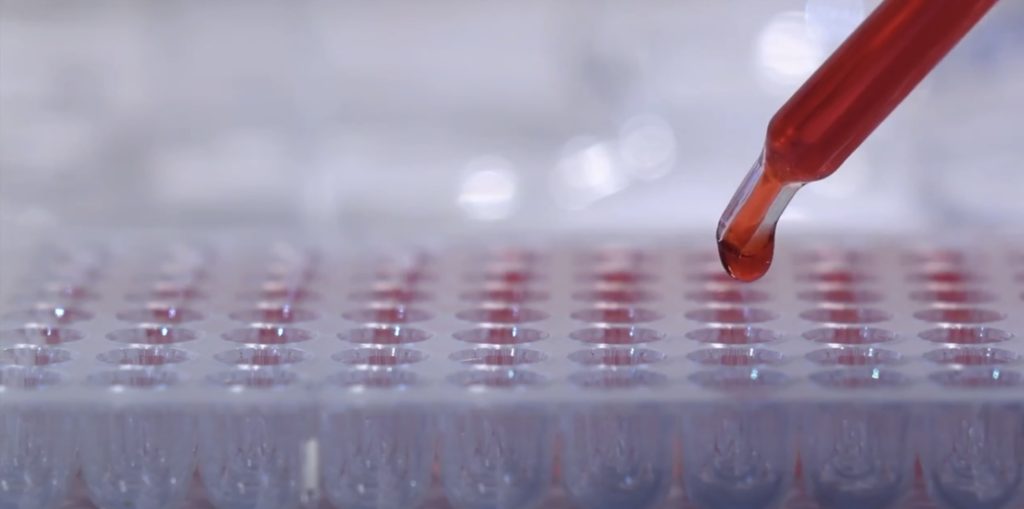
Another important aspect is scientific research.
Although research is not critical, if you have such experience, it will definitely enhance your application, especially for students who are interested in MD/PhD programs. I will talk about it in-depth later on. If you can participate in research and even publish during your undergraduate years, then med schools would certainly be impressed.
Leadership skill is also quite important.
As a doctor, you usually need to lead a medical team. You need to master skills like organization, communication, and instruction. Of course, you’ll be able to cultivate these skills in med school. But if you are able to practice those during college, then it’s definitely good for your application.
Finally, let’s talk about work experience.
This may not be difficult for American students. Many of them may have already worked a job during high school around their neighborhood. But for international students, it may be difficult due to our visa status. But, there are still many on-campus job opportunities for international students. You can develop your personal finance skills from working. It can also reflect your diligence. Another benefit for international students to find a job on campus is to get an SSN. This is quite important for living in the U.S. Because with an SSN, you can apply for a credit card and start building a credit history. Of course, this is a topic for another day.
Some helpful examples of what I did
First of all, when it comes to major, I picked biomedical engineering. GPA for engineering majors tend to be lower on average. But med school will evaluate your GPA base on the difficulty of your coursework. I chose this major because I believe it is quite beneficial for clinicians to have a deeper understanding of how medical technologies works. With an engineering mindset, it is also helpful when designing a new instrument or technique whenever a need arises. Also, if I don’t get admitted to medical school, I can still continue to study engineering or find an engineering-related job. I have yet to take the MCAT, but I will start looking into it this summer and start preparing. Currently, I have taken most of the prerequisite courses. I just have biochemistry left, which I will take next semester. For volunteering, I have done some during my freshman and sophomore year. I did some volunteering at UF hospital and a local food bank. I will definitely spend more time volunteering in the future. Currently, I have not yet done anything related to shadowing. Originally, I planned to shadow a doctor this summer, but due to the pandemic, we had to postpone it to a later date.
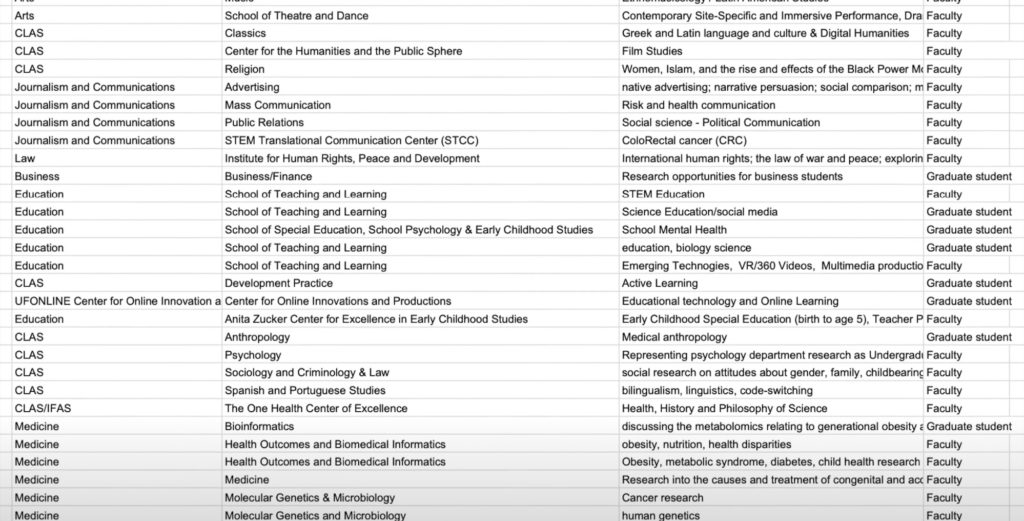
Regarding research, I was fortunate to be involved in a lab during my first year. I have for sure learned a lot. I would suggest looking for a research position as early as possible. During freshman year, schools generally have these research events, so you get the opportunity to chat with different professors and faculties. But before you attend, make sure you are prepared. Bring your resume, check out the list of people who are attending, research on people who you are interested in talking with, read some of their papers so that you have some talking points when you meet them. Also, don’t forget to ask for their contact information, so you can email them when you get home asking for a potential interview. Remember, don’t rush to a decision when you get an offer. At this time, you should contemplate even more thoroughly if you are truly interested in this research. This was the case for me. I was so excited when I got my first offer; I thought I needed to say yes before it was too late. I surely learned a lot, but since I later found out I didn’t enjoy what I was doing, I have not only wasted my own time but also my mentor’s time. So be sure to think carefully, then decide whether to participate. It’s time-consuming to do research during undergraduate. You have your own coursework, and other school activities, then there is this research. Generally speaking, it takes about one semester to get familiarized with the lab personnel and procedures; after that, you might be able to get results. And if you want to publish, it takes even longer. So you must be patient with doing research.
Regarding leadership, I have had some experience. I had a position in UF Chinese Student Association. I have also led an engineering design team and did some projects. I have also spent some time in the College of Engineering, advising new students about their course schedules. Please remember, no matter what you do, make sure you can demonstrate your teamwork ability, organizational skills, and communication skills. Actually, I recommend you have a place to take notes. Write down all the activities you have participated in, also write down what kind of abilities you have cultivated in these activities. Therefore, at a later date, there’s a reference when writing a resume or preparing for an interview.
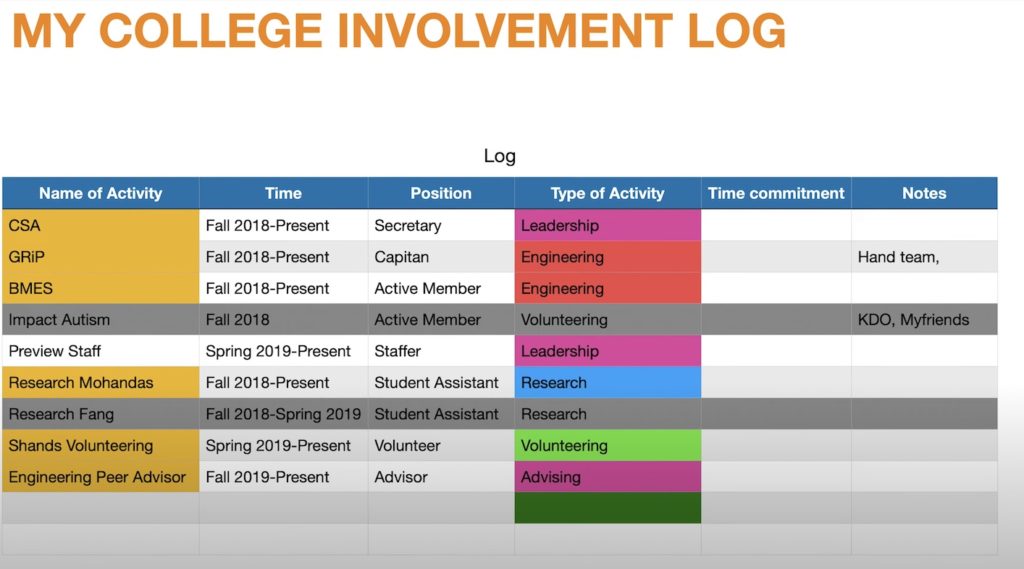
Regarding work experience, I have done a short summer job called Preview Staffer. It is the orientation team of our school. We helped freshmen to become familiar with the campus and helped them develop their first-semester schedule. Last summer, my team and I welcomed about 8,000 students and 10,000 family members to the UF campus.
What if I’m an international student?
First of all, as an international student, applying to med school is extra difficult. Because not all medical schools in the U.S. will accept international students. For example my school, UF, would not accept international medical students. When I investigated last year, there were about 40 to 50 med schools in the U.S. that would accept international students. And even if they accept, it is for sure a small percentage who are international students. I can understand this since most schools have limited funding and availability. If you completed your bachelor’s in America, this process might ay be simpler. Because if you did your undergraduate in another country, med schools might have some additional requirements, and the transcript may also not meet the requirements. You can go to the AAMC website for more detailed information. This website can be very helpful. It has many useful resources for applying to med school.
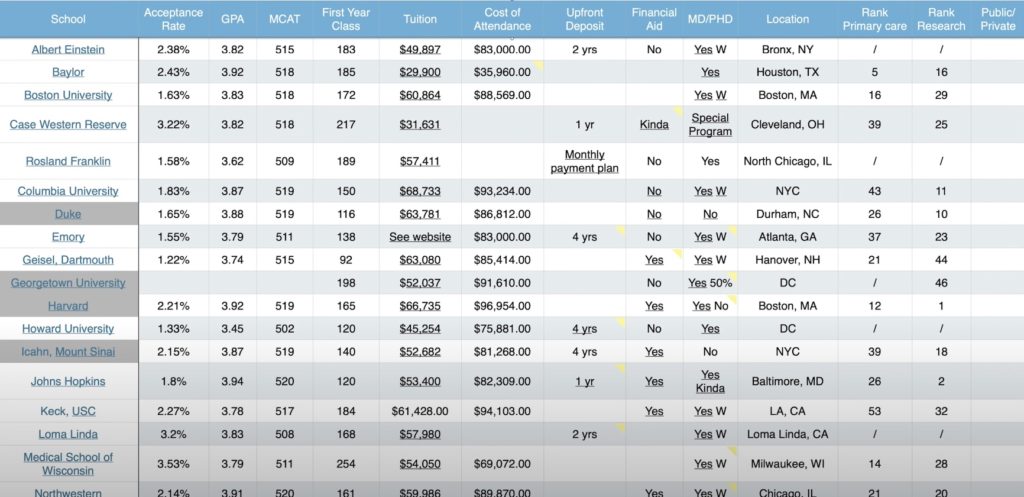
Also, the tuition for med school can be very expensive, and they rarely offer financial help to international students. But there are still some schools that will offer scholarships, so we still have a fighting chance. In addition to expensive tuition, some schools will even require you to have one or two years or even four years of proof of funds for your tuition. So make sure you check with the school before applying.
But there is indeed a way to save tuition. It’s the M.D./Ph.D. program I mentioned earlier. This program is even more difficult than applying for M.D. directly. Fewer people are admitted. Generally, there are less than 20 people in a class. So there are maybe one or two international students. This program includes four years of M.D.; after that, there is an additional Ph.D degree for two to four years. You can choose your own research focus. This program requires a lot of research experience and a passion for scientific research. The advantage is that tuition fees for this program are entirely waived, and they will also offer you a stipend. But there is a catch, since some schools are funded by the federal government, they cannot give international students any financial assistance. But this program still shines a glimpse of hope to international students. So let’s work towards it.
We only talked briefly today about some steps to apply for medical school. This is just a small step in the path of studying medicine. After you are admitted to medical school, there will be more challenges, for example, the USMLE Step 1, Clinical Skills, Step 3, and the matching process, as well as your residency. There are many many more challenges. Studying medicine in America is quite a long journey. But let’s focus on applying first. After all, being admitted is the first step towards all the future obstacles.
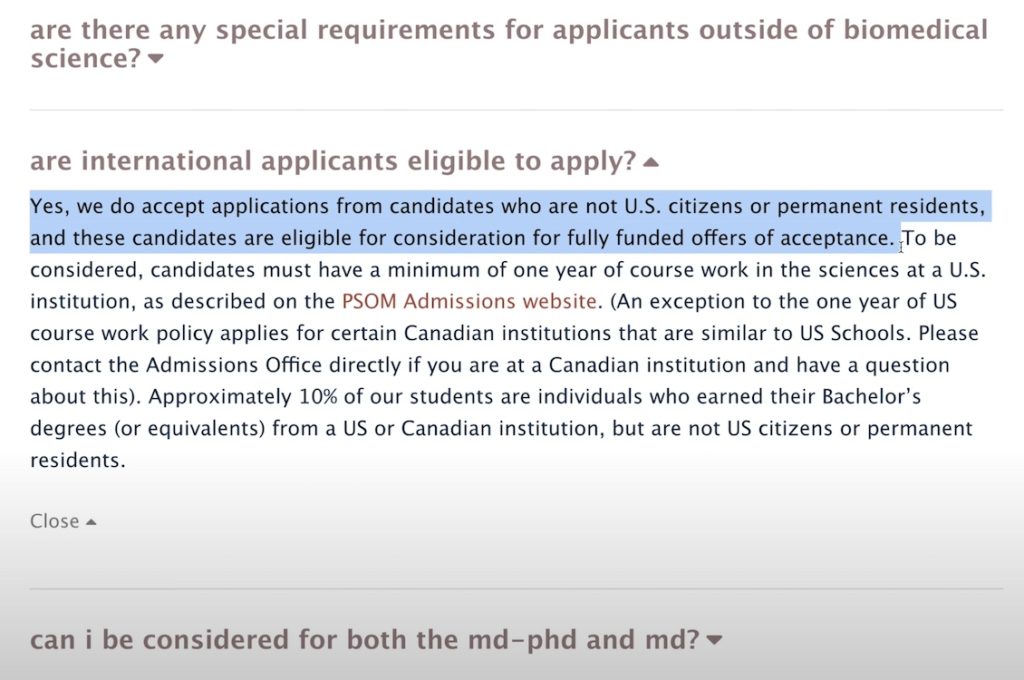
Some heart-to-heart…
a Medicine is definitely a difficult profession to get into, especially for international students. But if you have enough perseverance and enthusiasm, it is completely attainable. Actually, when I was still in China, I often search for people who are similar to my situation and already are in medical school or are already physicians. Watching their stories, I felt a lot of motivation. Although we are doing what seems impossible, there are people who actually did it. Don’t forget to set goals for yourself, whether it is short-term or long-term, and be sure to find someone who can inspire you. On the path to studying medicine, there will be times when you want to give up because there are many other occupations that earn a lot of money and have a better lifestyle but don’t require you to dedicate this much to get in; however, if you don’t care about these difficulties and still are full of enthusiasm for studying medicine. Then you will definitely become a great doctor.
